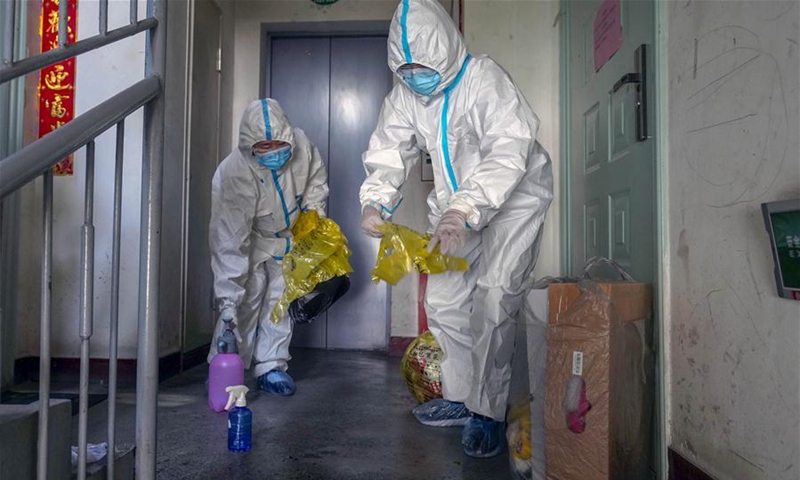Xinjiang officials release phone numbers to appease public dissatisfaction over long COVID-19 lockdown
By Liu Xin and Liu Caiyu Source: Global Times Published: 2020/8/25 22:13:40
Move aims to appease dissatisfaction over long COVID-19 lockdown

Qiu Tingting (R) collects garbage of the residents in quarantine at Renminlunan Community, Tianshan District of Urumqi, northwest China's Xinjiang Uygur Autonomous Region, Aug. 6, 2020. Qiu Tingting, 33, the secretary of the Renminlunan Community branch of the Communist Party of China, has been working tirelessly in the community during the COVID-19 epidemic. Residents in this community regard Qiu and her colleagues as "community servants at the frontline of epidemic prevention and control" for their careful and thoughtful work. (Xinhua/Zhao Ge)
"A swift response to people's concerns…" Urumqi residents made this comment about a move by major officials in the city to release their phone numbers to help locals address inconveniences and anxieties in daily life caused by a long coronavirus-related lockdown. Observers said that aside from fighting the virus at the most difficult stage, Xinjiang is gaining experience in dealing with public opinions and governance.
The Urumqi Party secretary and the mayor, and 17 other major officials, made their phone numbers public in a notice on Monday night, saying people can contact them directly to discuss their difficulties. Following Urumqi, Hotan Prefecture in southern Xinjiang released a contact list of major officials and community chiefs.
The moves came after netizens and locals flocked to social media to post complaints about the inconvenience caused by the long lockdown as well as problems emerging in grassroots management, including the delivery of living materials.
The Global Times dialed the phone numbers of some officials, and found that some were busy and some were answered. A few officials who declined interview requests said the phone numbers were set up specifically to help local residents.
Cheng Xinjian, director of the administrative committee of Ganquanpu Economic and Technological Development Zone in Urumqi, told the Global Times that the office has answered questions from residents on when to lift indoor quarantines and helped arrange the delivery of daily necessities.
Zheng Ping, a community official at Nuerbage street in Hotan, whose phone number is on the list, said that one main concern of local residents was how to get their children back to school outside Xinjiang, as many inland cities have announced the reopening of schools. Arrangements are being made, Zheng said.
To better help residents of different ethnic groups, officials and staff who can speak ethnic languages are also being delegated to take phone calls, according to Zheng.
Some Xinjiang residents reached by the Global Times reacted positively to the move, saying that they can report problems to senior officials as some coordination work is beyond an individual community's reach. These calls also serve as channels to complain about problems in the basic implementation of some policies.
The move shows the local government's sincerity in listening to the voices of the people, a Urumqi resident surnamed Luo told the Global Times.
Since the latest outbreak, Xinjiang has set up hotlines and online channels for inquiries and complaints. Regional hotlines have received more than 102,000 calls from local residents and helped with 774 specific problems. City and prefecture hotlines have received more than 1.25 million calls that related to 1.23 million demands and questions, with 98 percent already solved, Xinjiang media outlet ts.cn reported Tuesday.
"People can vent their discontent due to inconvenience caused by such a long, strict lockdown, but our hope for lifting the quarantine and getting back to normal remains the same," Luo said.
Anti-epidemic measures are actually easing in Xinjiang. Starting from Sunday, Urumqi residents from certain regions were allowed to walk around within the community on the condition of wearing masks and maintaining social distances. The Global Times learned that many other places in Xinjiang also began to lift strict lockdown measures on Monday.
Experts noted that compared with Beijing, which has the ability to take targeted measures in areas with different level of risks, many cities in Xinjiang are short on experience and social governance ability in terms of smoothly dealing with urgent situations, like a coronavirus outbreak.
They also noted that as a region that had the trauma of terrorism, some people in Xinjiang may be inclined to give priority to stability and take a one-size-fits-all approach in managing other issues. The sentiments that have emerged online are understandable and the governments' responses also showed that the region is gaining more experience in dealing with new situations.
Newspaper headline: Xinjiang officials release phone numbers
RELATED ARTICLES:
Posted in: SOCIETY